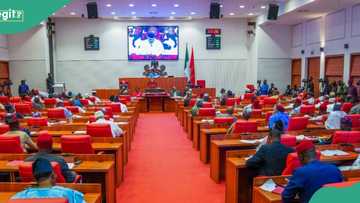State Police: Constitutional Amendment Imminent as Statutory Conditions Emerge for Governors
- Legislative moves are ongoing to decentralise the Nigerian Police Force (NPF) due to the rising insecurity issues in the country
- This move would help form the state police and state police service commission independent from the federal police
- However, statutory provisions and limitations have already been highlighted in the proposed bill that has passed its first reading at the Green Chamber
Legit.ng journalist Segun Adeyemi has over 9 years of experience covering political events, civil societies, courts, and metro
A legislative proposal to amend the 1999 Constitution to grant state governors the authority to nominate state police commissioners advanced through Tuesday's second reading in the House of Representatives.
This proposed constitutional amendment seeks to establish state police forces headed by commissioners selected from active-duty officers within the state.

Source: Twitter
This move is part of broader efforts to decentralise the Nigeria Police Force, which has struggled to tackle the country's escalating security issues effectively.
PAY ATTENTION: Click “See First” under the “Following” tab to see Legit.ng News on your Facebook News Feed!
Nigeria has been plagued by a wave of violence perpetrated by bandits, kidnappers, and other criminal elements, resulting in frequent violent incidents where citizens are often kidnapped, murdered, or seriously injured.
Despite the implementation of various security measures and the increased presence of law enforcement personnel nationwide, the ongoing surge in criminal activity continues unabated, with armed assailants operating with impunity in both urban and rural areas.
Titled ‘A Bill for an Act to alter the Constitution of the Federal Republic of Nigeria, 1999 to Provide for Establishment of State Police and Related Matters,’ the proposed legislation, led by Deputy Speaker Benjamin Kalu and supported by 14 others, seeks to shift policing from the exclusive legislative list to the concurrent list.
Currently, policing is solely under the jurisdiction of the Federal Government according to the 1999 Constitution.

Source: Facebook
Legislation at lower chambers
In spearheading the discussion on the fundamental principles of the proposed legislation, Tolani Shagaya, who co-sponsors and represents the Ilorin West/Asa Federal Constituency, emphasised that according to Section 14(2)(b) of the 1999 Constitution of Nigeria, the primary responsibility of the government is to ensure the security and well-being of its citizens.
He highlighted the significant challenges to national security experienced in recent years, underscoring the necessity of establishing state police to complement the Federal Government's endeavours in securing the nation for all its inhabitants.
He emphasised the significant innovations in the proposed amendment bill, stating that moving police from the exclusive legislative list to the concurrent list, thereby allowing states to establish their police forces, setting up a detailed framework to promote unity, accountability, and consistent standards across both federal and state police forces; and implementing strict protective measures to limit undue federal police involvement in state police matters, ensuring cooperation and intervention only in specific situations.
Shagaya also highlighted additional significant elements of the bill, such as creating state police service commissions, which are separate from the Federal Police Service Commission, with their roles and jurisdictions explicitly outlined.
Moreover, the bill proposes restructuring the National Police Council to incorporate the chairpersons of the state police service commissions, underscoring the importance of cooperation and consultation in the country's federal policing structure.
The proposed changes also acknowledge the potential fiscal difficulties state police might encounter, necessitating financial assistance or Federal Government grants contingent upon the National Assembly's consent to guarantee sufficient funding for efficient law enforcement.
Additionally, the amendment suggests that the governor's appointment of the state commissioner of police should be based on a recommendation from the Federal Police Service Commission and with the endorsement of the state legislature.

Source: Facebook
Statutory conditions for removal of CPs
Nonetheless, the governor has the authority to dismiss the CP, provided it is done on the advice of the Federal Police Service Commission and with the approval of at least two-thirds of the state assembly.
According to Punch, Section 215 (4) of the bill provides that:
“A state police shall be headed by a commissioner of police who shall be appointed by the governor of the state on the advice of the Federal Police Service Commission from among serving members of the state police subject to confirmation by the state House of Assembly.’’
Section 216 (3) read:
“A Commissioner of Police of a state shall only be removed by the governor upon the recommendation of the Federal Police Service Commission praying that he be so removed on the grounds of (a) misconduct in the performance of his official duties (b) breach of policing standards, law, regulation, and code of conduct (c) conviction of any offence involving fraud or dishonesty by a court of law or tribunal and (d) bankruptcy and mental incapacity.’’
The governor or any commissioner serving under him can issue orders to the police commissioner.
However, should these directives be deemed unlawful, the police commissioner can escalate the issue to the State Service Commission.
This body holds the ultimate power to decide on the matter.
The statute states:
“The governor or such other commissioner of the government of the state as he may authorise on that behalf may give to the commissioner of police such lawful directions concerning the maintenance and securing of public safety and order as he may consider necessary, and the commissioner of police shall comply with those directions or cause them to be complied with.”
Moreover, the bill mandates that the National Assembly must verify the state police service commission twice a year to ensure it adheres to national standards.
Under Section 216 (b) of the proposed legislation, the state police will have the authority to carry weapons as specified by a National Assembly Act.
The amendment proposal includes 18 sections aiming to modify sections 34, 35, 39, 42, 84, 89, and 129 of the Constitution of the Federal Republic of Nigeria (as amended).
Additionally, the bill aims to revise sections 153, 197, 214, 215, and 216, along with Chapter IV, Part III, the Second Schedule, Part II of the Third Schedule, and Part III of the Third Schedule of the Constitution.
Statutory obligations of federal police
The proposed bill seeks to amend section 214 of the Constitution, which pertains to the Establishment of Federal and State Police, to differentiate between the federal and state police forces.
Section 214 (3a) reads
“The federal police shall be responsible for the maintenance of public security, preservation of public order and security of persons and property throughout the federation to the extent provided for under this Act or by an Act of the National Assembly; and
“(b) be responsible the maintenance of public security, preservation of public order and security of persons and property within a State to the extent that the State has power to make laws under this constitution.’’
According to the bill, the federal police are prohibited from meddling in the activities of state police or the internal security matters of any state unless there's a significant threat to public order and the state police are incapable of addressing it.
In such cases, the federal police can only step in if the governor asks explicitly for their assistance in maintaining or restoring law and order within the state.
Kaduna governor makes case for state police
In another report, Governor Uba Sani of Kaduna State highlighted the critical necessity for creating state police forces to tackle the escalating security issues.
This call for action follows a recent surge in bandit attacks in various communities within the state, resulting in numerous fatalities.
Governor Sani believes that the fight against banditry, terrorism, and other forms of crime can only be effectively waged by instituting state-level policing.
PAY ATTENTION: Donate to Legit Charity on Patreon. Your support matters!
Source: Legit.ng









